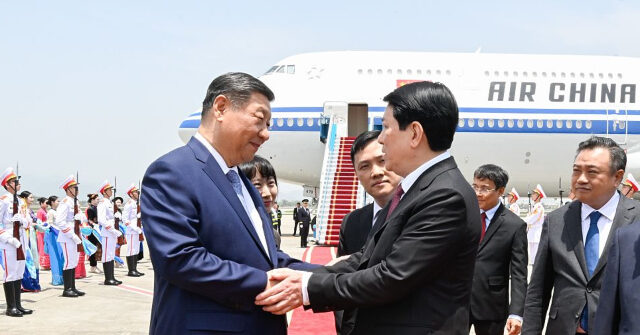President Donald Trump remarked on the “lovely meeting” between genocidal Chinese dictator Xi Jinping and Vietnam’s Communist Party chief To Lam on Monday, claiming they were trying to find an answer to the question, “How do we screw the United States of America?”
Trump made the comments during a meeting at the White House with visiting President of El Salvador Nayib Bukele, who, despite developing a strengthening friendship with Trump, has embraced significant Chinese investment in his country. The American president was reportedly answering a question about the relationship between China and Vietnam in the context of ongoing trade tensions between Washington and Beijing.
President Trump announced the imposition of “reciprocal” trade tariffs on nearly every country that does business with the United States on April 2, which he dubbed “Liberation Day.” The tariffs were determined through a formula taking into consideration America’s trade imbalances with the countries involved. Due to Vietnam’s high volume of exports to America, the Trump administration imposed a 46 percent tariff on its products.
Vietnam was among the first countries to send a delegation to Washington to negotiate a better agreement hoping to eliminate the tariff. After speaking to communist leader To Lam shortly after the tariff announcement, Trump said in a post on social media that the Vietnamese government was open to negotiating a deal that would result in America paying no tariffs for access to the Vietnamese market.
“Just had a very productive call with To Lam, General Secretary of the Communist Party of Vietnam, who told me that Vietnam wants to cut their Tariffs down to ZERO if they are able to make an agreement with the U.S.,” Trump said in a social media post. “I thanked him on behalf of our Country, and said I look forward to a meeting in the near future.”
In stark contrast to Vietnam’s approach, the Communist Party of China responded to “Liberation Day” by increasing tariffs on American products repeatedly. On Monday, the government announced it would limit exports of rare earth minerals, a group of 17 elements that are commonly used in high-technology manufacturing, particularly for green energy products, military items, and batteries. China is the world’s dominant producer and refiner of rare-earth minerals as the refining process is environmentally devastating, leading would-be competitors to hesitate in mass production.
Trump paused tariffs on every nation except for China last week, claiming that only China refused to renegotiate its trade relationship with America. While this meant that Vietnam is currently not subject to the 46 percent tariff to ship goods into America, experts still expected the issue to be a primary concern during Xi’s visit to Hanoi on Monday and Tuesday.
Trump addressed Xi’s visit from the White House on Monday, sarcastically calling it “wonderful” to see two repressive communist dictatorships come together.
“I don’t blame China. I don’t blame Vietnam. I don’t. I see they’re meeting today. Is that wonderful?” he asked reporters. “That’s a lovely meeting… like trying to figure out, ‘How do we screw the United States of America?’”
Trump went on to claim that he “likes” Xi personally and, “he likes me,” independent of their nations’ fraught trade relationship.
Xi arrived to a lavish welcome ceremony in Hanoi on Monday, greeted by a massive military band and an enthusiastic mandated communist crowd. While he has abstained from participating too closely in his country’s belligerent response to the Trump tariff policy, the dictator addressed tariffs generally in an article to the Vietnamese people published by the Vietnamese newspaper Nhan Dan shortly before his arrival.
“Trade war and tariff war will produce no winner, and protectionism will lead nowhere,” Xi proclaimed. “Our two countries should resolutely safeguard the multilateral trading system, stable global industrial and supply chains, and an open and cooperative international environment.”
“During modern times, pioneers of Chinese and Vietnamese revolutions together explored a path to national salvation and made important contribution to the Third World’s victory in the struggle against colonialism and imperialism,” he claimed, encouraging Vietnam to increase its reliance on China. “The China-Viet Nam community with a shared future is based on strong political mutual trust.”
The message appeared to be not just in response to the American tariffs, but to Vietnam’s own tariff policy. Shortly before “Liberation Day,” the Vietnamese communist regime announced it would increase tariffs on Chinese-made steel in response to Chinese “dumping,” a practice in which a country exports high volumes of a good it has overproduced to a foreign country to drive down prices and harm domestic competitors in the receiving country.
Whatever discord may have led to the steel tariffs was not visible during Xi’s visit to Hanoi. The two countries signed over 40 agreements on a variety of topics including shared promotion of communism, railway and other transportation development, firefighting, environmental policy, military cooperation, and “people to people” exchanges.
An extensive joint statement published by the two countries emphasized their status as “good neighbors, good friends, good comrades, and good partners.” Most of the economic provisions of the joint statement addressed road and rail development, particularly as part of China’s predatory Belt and Road Initiative (BRI), but the statement also addressed increasing bilateral trade in some fields.
“The two sides encourage and support capable and prestigious companies with advanced technology to invest in each other’s countries, create a fair and favourable business environment for enterprises,” the statement read. “Welcoming the cooperation between the two countries’ enterprises in researching and applying 5G technology. Enhancing collaboration in emerging fields such as artificial intelligence, clean energy, green development, and digital economy.”
Follow Frances Martel on Facebook and Twitter.
Read the full article here
